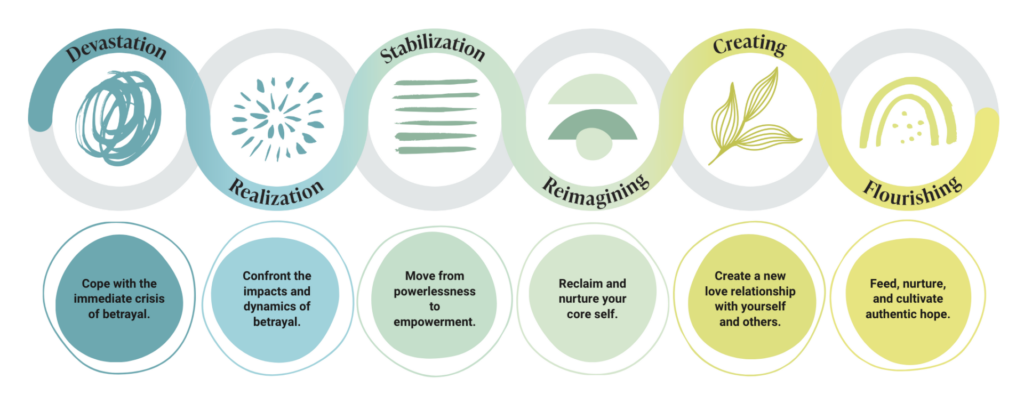
Last week we talked about the transition out of the initial shock and devastation phase of discovery into the realization phase, where betrayed partners develop a new understanding of their situation. As discussed in the previous post, betrayed partners typically have the following three realizations:
- Realization #1: The problem is bigger than I thought.
- Realization #2: I’m not going to just get over it and move on from this.
- Realization #3: Healing from betrayal trauma is a process that takes time.
This week we are going to talk about the burning questions and common experiences that are hallmarks of the realization phase for betrayed partners. As the initial overwhelm of discovery starts to lessen and partners begin to absorb new information and recognize the ways in which their sense of reality has been altered by betrayal, they tend to ask the following questions:
- Do I stay, or do I leave my relationship?
- How do I know if he/she is still lying or cheating?
- What is sex addiction? How do I know if he/she is a sex addict?
- What is betrayal trauma and is it possible to heal? What does recovery involve?
- How will I ever deal with all that I’ve lost?
- Is there hope for me? For my relationship?
- Where can I get the help that I/we need?
In addition to these burning questions, there are common experiences that betrayed partners tend to have during this phase. These experiences mark the partner’s movement from devastation into realization:
- Intense feelings of loss, uncertainty, anger, and pain washing through in waves as the reality of what has happened becomes clearer and is further absorbed and processed.
- A high level of need for information about betrayal trauma, sex addiction, infidelity, and the process of recovery.
- Assessment of options, such as staying in the relationship, leaving the relationship, therapeutic separation, and the potential for healing.
- Recognition of a personal need for help and support to heal from the betrayal and the trauma symptoms that are being experienced.
- Attempts to cope with trauma symptoms, leading to both healthy (talking to empathetic others) and unhealthy (binge eating, compulsive spending, drinking, etc.) coping behaviors engaged in to manage uncertainty, fear, and other uncomfortable emotions.
- Recognition of the need for outside expert help and support in navigating recovery, dealing with relational fallout, and healing from betrayal trauma.
- A high level of need for full disclosure—the entire scope and extent of the cheating behaviors and dishonesty.
- Increasing identification of the lies and misinformation the cheating partner has told to cover up his or her behavior. Connecting the dots and seeing much more clearly the degree of lying and manipulation that has accompanied the cheating.
As you can see from this list of common experiences, the realization phase is marked by an increasing awareness and understanding for betrayed partners of both the problem itself and what it will take to deal with and repair the damage done. As your new reality begins to sink in and you begin to process different parts of your experience and new facets of your altered reality, you can expect to ride the roller coaster of quickly changing moods and emotions.
There are two other common experiences that occur for betrayed partners during the realization phase. I want to focus on these separately because these two experiences form a danger point for partners. They are a place where partners can veer off the path of healing, returning to continued chaos and deepening betrayal. They are:
- The temptation to try quick fixes.
- The danger of exiting the healing process and moving into denial due to fear and overwhelm.
Intimate betrayal is a difficult challenge to face, and sometimes partners choose to not face it. When betrayed partners are presented with the severity of their situation, they sometimes give in to the temptation to avoid fully looking at and seeing what has happened. This is called betrayal blindness, and it happens because it feels too scary and threatening to your relationship and your life as you know it to let yourself fully know and experience the full truth.
Partners who experience betrayal blindness move into a version of denial, ignoring, devaluing, refuting, or minimizing information. When this happens, they are susceptible to believing ongoing lies that the cheating partner may be telling—all because they want to believe that what they have discovered is all there is to deal with. They mistakenly hope that an appointment or two of couple’s therapy is all that is needed for healing, or that a few big fights and conversations with their significant other will set things back on track.
The temptation of betrayal blindness is to slap a band-aid on a bigger wound and ignore the fact that it is still seeping around the edges. Sometimes, betrayed partners will actually discourage their significant other from entering sex addiction treatment or therapy, even though an impartial outside observer would say this treatment is very clearly needed. Once again, partners do this because they are afraid to face the full reality of the problem and what it might mean for their life and their relationship.
This fear is common and very real, and your desire to avoid something so scary and potentially painful is understandable. However, my experience working with betrayed partners tells me that this avoidance is usually nothing more than a detour that brings you back to the same frightening spot and the same potentially painful choices. And sometimes, while you are wasting precious time and energy going nowhere on the detour, the situation gets worse instead of better.
If you can be aware of this very real temptation to engage in betrayal blindness by engaging in denial or going for the quick fix, it will help you stay with the natural and necessary unfolding of the realization phase, and to eventually move through it. And this is a very good thing, because after realization comes the stabilization phase. That is what we will begin talking about next week.












